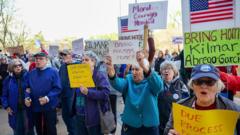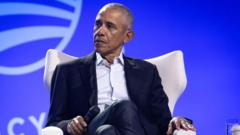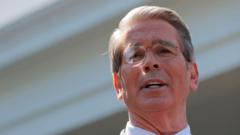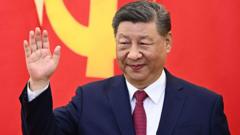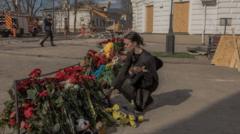President Bukele's refusal raises eyebrows as it underscores tensions in U.S.-El Salvador relations amid ongoing legal disputes.
El Salvador Stands Firm Against U.S. Deportation Requests

El Salvador Stands Firm Against U.S. Deportation Requests
In a surprising diplomatic stand, El Salvador's President Nayib Bukele rejects U.S. requests to return a wrongly deported citizen.
El Salvador's President Nayib Bukele made headlines this week following a White House meeting with U.S. President Donald Trump, where he firmly rejected a request to return Kilmar Armando Abrego Garcia, a man deported from the United States under contentious circumstances. Bukele labeled the potential return as akin to smuggling a "terrorist" back into the U.S., thereby directly defying what he described as an "administrative error" on the part of the Trump administration.
During the meeting, which elicited mixed reactions from political commentators, Trump appeared to endorse Bukele’s position. This situation is complicated by a Supreme Court ruling that requires the U.S. government to facilitate Abrego Garcia’s return, a directive that the current administration has openly resisted.
The case has highlighted ongoing controversies surrounding immigration policy and international relations, particularly between the U.S. and Central American countries. The exchange was characterized by Zolan Kanno-Youngs, a White House correspondent, as emblematic of foreign leaders seeking to placate Trump during high-stakes visits.
As political tensions rise, Trump's administration is also preparing for other confrontations, having recently signaled intentions to impose tariffs on imported goods, particularly computer chips and pharmaceuticals. Meanwhile, agencies are bracing for a potential round of mass firings as discussions regarding economic strategies unfold.
As the international landscape evolves, the ripple effects of these decisions are being felt across U.S. borders, illustrating the complex interplay between immigration reform, economic policy, and diplomatic relations.
During the meeting, which elicited mixed reactions from political commentators, Trump appeared to endorse Bukele’s position. This situation is complicated by a Supreme Court ruling that requires the U.S. government to facilitate Abrego Garcia’s return, a directive that the current administration has openly resisted.
The case has highlighted ongoing controversies surrounding immigration policy and international relations, particularly between the U.S. and Central American countries. The exchange was characterized by Zolan Kanno-Youngs, a White House correspondent, as emblematic of foreign leaders seeking to placate Trump during high-stakes visits.
As political tensions rise, Trump's administration is also preparing for other confrontations, having recently signaled intentions to impose tariffs on imported goods, particularly computer chips and pharmaceuticals. Meanwhile, agencies are bracing for a potential round of mass firings as discussions regarding economic strategies unfold.
As the international landscape evolves, the ripple effects of these decisions are being felt across U.S. borders, illustrating the complex interplay between immigration reform, economic policy, and diplomatic relations.



